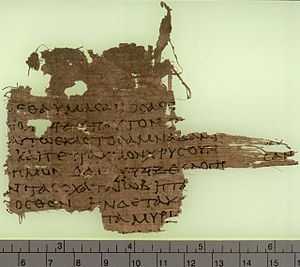Papyrus Oxyrhynchus 3522

The Papyrus LXX Oxyrhynchus 3522, signed as P.Oxy.L 3522 – is a small fragment of the Greek Septuaginta written in papyrus, in scroll form. This is one of the manuscripts discovered at Oxyrhynchus, it has been catalogued with the number 3522. Palaeographically it has been dated to the 1st century BCE.
Description
This fragment contains Job 42,11-12, and contais the tetragrammaton for the Divine Name.[1] This is one of the fragments of the Septuaginta with the Divine Name.
The fragment was published in 1983 by P. J. Parsons in The Oxyrhynchus Papyri, vol. L (50).
Also the fragment is catalogued with number 857 in the list of manuscripts of the Septuaginta as the classification of Alfred Rahlfs, also as LDAB 3079.[2]
Actual location
Actually the manuscript is kept at Papyrology, in Sackler library located at Oxford as (P.Oxy.L 3522).
See also
- Papyrus Fouad 266
- Papyrus LXX Oxyrhynchus 1007
- Papyrus LXX Oxyrhynchus 5101
References
- ↑ Emanuel Tov (2001). Textual Criticism of the Hebrew Bible. Minneapolis: Minneapolis: Fortress Press; Assen: Royal Van Gorcum. p. 220. ISBN 0-8006-3429-2.
- ↑ Larry W. Hurtado (2006). The Earliest Christian Artifacts: Manuscripts and Christian Origins. Sheffield: Wm. B. Eerdmans Publishing Co. p. 213. ISBN 0-8028-2895-7.
Bibliography
- P. J. Parsons. "P.Oxy.L 3522". Oxyrhynchus Online. The Oxyrhynchus Papyri vol. L. Retrieved April 21, 2012.